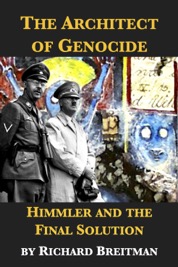 $9.99 on Kindle, Nook, Apple Books, Kobo, Google Play
$9.99 on Kindle, Nook, Apple Books, Kobo, Google Play(cover by Susan Erony)
The Architect of Genocide: Himmler and the Final Solution by Richard Breitman (139,000 words)
Winner of the Wiener Library Ernst Fraenkel Prize in 1990.
“Breitman’s book is a historian’s carefully researched work, based on a vast array of sources, documenting Hitler’s and Himmler’s responsibility for the murder of European Jewry. The book details the planning and the improvisations, but emphasizes the former and Himmler’s fanatical hatred of the Jewish race as the determinative cause of the Holocaust. Dealing with a charged controversy, Breitman makes a powerful case that by March 1941 ‘the Final Solution was just a matter of time — and timing,’ i.e., that the Holocaust was not a reflex of Hitler’s fear that the war in Russia could not be won. Breitman argues that the Wannsee Conference merely ratified the plans and instructed other agencies to cooperate. Breitman records the instances of resistance or opposition, but notes that of course the cooperation of thousands (many still alive and never tried) and the complicity or silence of millions were needed to carry out the murder... the book concludes that Himmler’s ‘brutality was more learned than instinctive or emotional’ — a methodical murderer impelled by racist dogma.” — Fritz Stern, Foreign Affairs
“Breitman’s book is decisively important... [It] should serve for years to come as required reading for all who wish to make sense of the Holocaust.” — Daniel Jonah Goldhagen, The New Republic
“Looking nothing like the Nordic ideal he advocated, Heinrich Himmler, chief of the Nazi SS, was short, flabby and balding — his dull, pedantic exterior disguising the caustic, cowardly, Machiavellian, immensely cruel master of deceit within. Breitman... presents compelling evidence that the extermination of Jews was an early goal of Himmler, a Bavarian and lapsed Catholic, and his boss Adolf Hitler. Drawing on previously untapped German records, as well as other source materials... this engrossing, detailed study constitutes a powerful refutation of revisionist scholars who claim that Hitler did not plan the Final Solution in advance but instead improvised it out of either military or political frustration.” — Publishers Weekly
“A truly path-breaking book, one of the few that will have a lasting impact on historical research of the period. It shows both the primacy of Hitler as the motivating force in the mass murder, and the way in which his initiatives were accepted and internalized by the SS, on the basis of ideology.” — Yehuda Bauer, Holocaust and Genocide Studies
“Chilling, expert history.” — Kirkus
“[A]n eminently sensible and judicious study that could well serve as a textbook on the topic.” — Lawrence D. Stokes, The Historian
“Breitman’s research [is] meticulous. Especially valuable are his novel insights into the full and frequent communication between Himmler and Hitler, who, it is known, seldom signed an order. Mr. Breitman presents his arguments cogently.” — Michael H. Kater, The New York Times Book Review
“An absorbing, important book [that] addresses the sequence of steps leading to the Final Solution.” — Zara Steiner, Financial Times
“As Breitman persuasively demonstrates, the situation kept changing, but Hitler was always in charge, and his goals always included ridding his empire of the Jews.” — Otto Friedrich, Los Angeles Times Book Review
“Breitman is on the hunt for smoking guns. He finds the goods littered throughout Himmler’s speeches and conversations... Breitman shows that people knew.” — Marc Fisher, Washington Post Book World
“The book is chillingly good on the uses and abuses of language to mask atrocity.” — Christopher Hitchens, Newsday
“Richard Breitman’s study is an important addition to [the] literature [on the origins of the Nazi genocide], one that provides the most likely scenario and settles important disputed questions... Breitman’s study is a major step forward in our understanding of how the Nazis initiated mass murder.” — Henry Friedlander, German Studies Review
“[An] important book... I much admire this work, particularly for its resourceful combing of primary material... there is much to learn from this book about the Final Solution, its origins, its implementation, and its hate-inspired architect” — Michael R. Marrus, The American Historical Review
“A convincing portrait of a man who would lose his repressive composure over the theft by his men of cigarettes, money, or watches but not over the thousands of dead to whom these things had once belonged.” — Michael Burleigh, Times Literary Supplement



